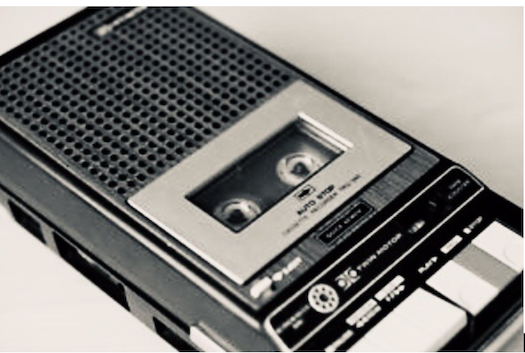A production feature from Abe Udy of Abes Audio
‘Sometimes, all you need is an old tape recorder and a lot of curiosity.’
Many voice over artists have a similar story about humble beginnings. Recently we sat down with Loz, one of our popular voiceover artists, to find out about what makes her tick and how she got her start in the industry.
How long have you been a voiceover artist?
If you ignore my early tape recorder days (see below), I started officially doing voice over sessions in 2003.

How did you start as a voice over?
When I was a kid, we’d all listen to the radio and use Mum’s old cassette deck to re-record the commercials (just like any aspiring voice over has done). We’d use silly voices or change the characters just to have a laugh.
That should have been a sign of what was to come for me, but in all honesty, I didn’t start out with a burning knowledge of what I wanted to do. I became involved in radio in 1998 and things unfolded and evolved.
Luckily for me, I was able to bundle my love of writing, performance and my inquisitive nature and channel it into creative writing and being a voice actor. I was called on for daily voiceover sessions, even as a senior script writer and creative director, and I loved every collaborative moment in the studio. Seeing ideas come to life (and turn from text to sound) with brilliant audio production was awesome!
10 years ago I moved to focus solely on being a professional voice talent, and it’s allowed me the flexibility to be a present parent while raising my family. And now, it’s my own kids who love getting behind the mic to record presentations for school, to experiment and be silly!
What’s one thing you wish you could tell your 21 year-old self?
Be brave. Stand up for yourself and your values. Hold gentle space for yourself. Persist.
How do you ‘get inside’ a script to find its meaning, ensuring you deliver an authentic, quality voiceover?
I’m highly curious, perceptual and empathetic. Being wired this way, I’m conditioned to consider things from another person’s perspective. So, I ask myself, if I were in someone else’s shoes, what would they do? What’s important to them?
Having been a writer for such a long time, exploring a character’s profile is second nature, and bringing that to a ‘performance’ is a natural progression. So I guess I approach voicing from a writer’s perspective…which if you think about it…is the audience’s perspective.
What are common traps a voice over talent should watch out for?
A voice over artist needs to convey a message in a way that the intended listener can connect with. Oftentimes it’s not the cleanest articulation or smoothest vocal modulation that’s going to do that. As trends change, voices need to adapt and keep pace. Which is why practicing a variety of genre styles is important, especially if working in a self-directed environment.
These are some common habits that require effort to overcome .
- Pacing:Speed inconsistencies that don’t take the listener into consideration.
- Pronunciation:Not adapting pronunciation to suit the style of the script, either by being overly formal or too colloquial.
- Tone:Not matching the tone (voice over style) to the script, losing the emotion and sounding forced, unnatural or stiff.
- Volume:Over-projection rather than using a conversational volume, especially for emphasis instead of pitch or elongation for keywords.
How much direction is too much?
A voice over relies on clear purposeful direction to be able to meet the brief, which everyone involved in the creative process should be following. Direction that clearly defines the delivery style, pace, personality and any key words to highlight will ensure the finished product is of high quality and just what the client has in mind.
Sometimes, having too many stakeholders involved in a voice session, each with their own varied opinions on delivery, can be detrimental to the process. When there’stoo much direction, what should be a rather fluid and organic process can be stifled by an overly clinical approach involving the unnecessary dissection of phrases until every ‘director’ feels satisfied. This can adversely impact the final product, with an over produced, and unnatural feel.
The balance for a smooth voice session happens when everyone has a clearly communicated brief and knows the framework. It’s fine to have a creative team involved in the session, though ideally one person acting as the mouthpiece for any direction works efficiently. A skilled director is able to articulate well to get the most from the voice talent, in as few takes as necessary.
Do you think ‘conversational’ voiceovers are difficult to perform?
A voice artist cannot make a piece of creative sound natural if it hasn’t been written using real-world language, so it’s important that the creative writing is on target.
To emulate a ‘slice of life’ situation such as a conversation, it has to sound authentic. There’s nothing authentic about everyday people spontaneously spouting offers, phone numbers, terms and conditions or sale dates. That kind of information sounds unnatural in the context of ‘a quick catch up over coffee’, or ‘sharing a beer with mates’, so using a ‘narrator’ voice is a common solution. With careful creative planning, an entertaining conversational style script is fun to read.
The sound design process poses a different set of challenges.
Self-directed talent working from different studios rely on both their acting ability and the skill of the audio producer to ‘place’ them in the same location. Using voice talent in separate studios does give you access to a wider pool of voices, but the producer must manage the process and project well to achieve a great end result.
What’s the funniest script you’ve ever read?
I love observational comedy…the things we see and do as part of our daily life that we can all relate to and make light fun of – it tickles my funny bone. Some years ago, I voiced a series of narratives for a campaign about crimes against coffee.
The humour was tongue-in-cheek and clean, with no put-downs and no clichéd stereotypes. It focussed on the thoughts that run through your mind when you meet a barista that doesn’t treat coffee with the respect it deserves!
They were so well scripted and an absolute delight to read, and I had a great laugh, even spotting myself and my own thoughts in the writing. I still giggle thinking about it!
If you’re a voice over talent, we’d love to hear how you got your start (and listen to your work.)
Contact us today – and tell us your story!


